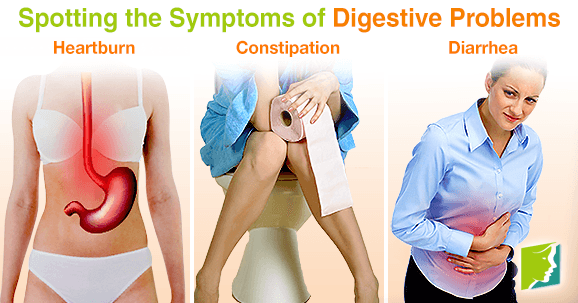Digestive problems are an issue for women of all ages and walks of life, although it is undeniable that they are particularly prominent during times of hormonal imbalance like menopause. It is important to recognize their symptoms so that you are able to spot and deal with them effectively. Once you are aware of what to look out for, you will be better equipped to restore your bowels back to efficiency. Continue reading to discover the most common symptoms of digestive problems.
Heartburn
Heartburn is one of the most frequent symptoms of digestive problems, and most people will have experienced it at some stage of their lives. The feelings of heartburn surface when stomach acid begins to flow incorrectly up the esophagus, the tube that connects the throat and stomach. This feeling can include a burning or gnawing pain in your abdomen. This can grow worse upon either lying down or eating. An acidic taste in your throat may also be present, along with a persistent cough during the evening and night. Some sufferers even experience voice hoarseness.
Constipation
Constipation is both a symptom of digestive problems and a digestive problem within itself. Although laxatives can relieve the pain of constipation, they should be used sparingly because it is easy for the body to grow overly dependent on them. Furthermore, many drugstore laxatives require a fair amount of dosage control in order to avoid excess electrolyte loss, although this can become difficult during long-term use because progressively larger dosages are needed.
Constipation can be best avoided by lifestyle changes, such as following a regular exercise regime, staying hydrated, and getting enough fiber into your diet. However, if constipation persists despite these things, then it could be a symptom of a bigger digestive problem, and you should make an appointment with your doctor to discuss it.
Diarrhea
Just like constipation, diarrhea too can be an annoying digestive problem in its own right, but it can also be a symptom of a range of other digestive problems. Although most people can recall experiencing episodes of short lived diarrhea because of infections, sometimes it can become a chronic problem.
Chronic diarrhea can be a symptom of a more severe condition that is affecting your digestion, and the risk of developing complications like dehydration or electrolyte imbalance should be enough to take the symptom seriously. Either way, if you begin to experience diarrhea on a regular basis, the advice of a medical expert should be sought.
Digestive problems can have a big impact on your day-to-day life. The best way to get on top of digestive problems is by learning what the symptoms are. This way you will know what to look out for, and be able to get the correct treatment before they escalate.
Sources
- Dugdale, D.C. (2012). Constipation: MedlinePlus Medical Encyclopedia. Retrieved December 6, 2013, from http://www.nlm.nih.gov/medlineplus/ency/article/003125.htm
- National Digestive Diseases Information Clearinghouse. (2013). Gastroesophageal Reflux (GER) and Gastroesophageal Reflux Disease (GERD) in Adults. Retrieved December 6, 2013, from http://digestive.niddk.nih.gov/ddiseases/pubs/gerd/
- National Health Service. (2012). Diarrhoea. Retrieved December 6, 2013, from http://www.nhs.uk/Conditions/Diarrhoea/Pages/Introduction.aspx




